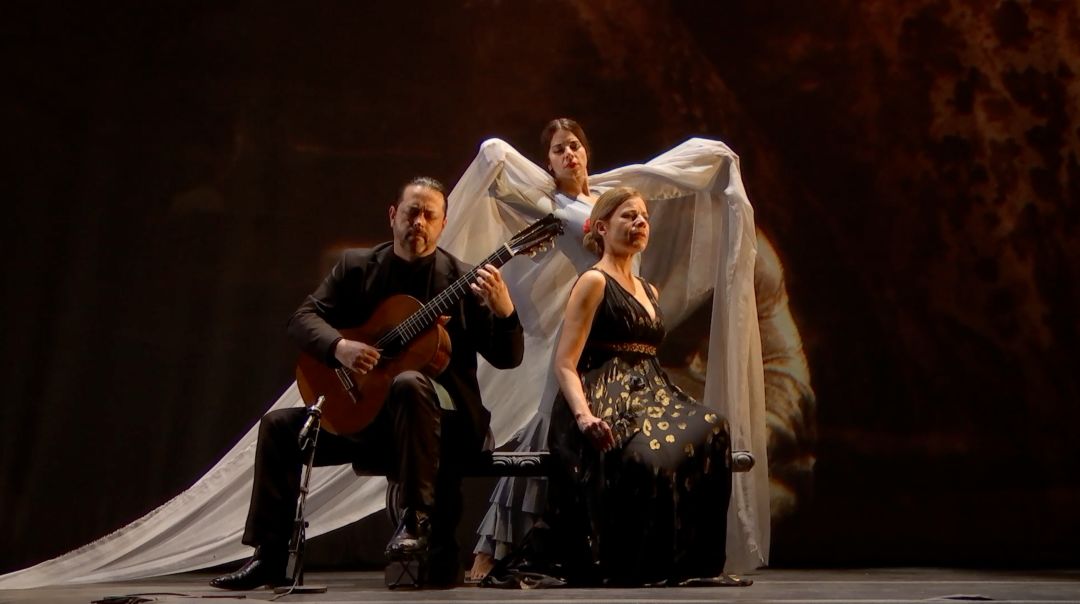Travel to Spain During Houston Grand Opera's New Concert

Image: Courtesy Houston Grand Opera
For Grammy Award-winner Ana María Martínez, Houston Grand Opera’s new Suite Española: Explorando Iberia is personal.
“According to 23andMe, I’m 90 percent Spanish, so I gotta represent,” the acclaimed soprano and first-ever HGO artistic advisor tells us with a laugh. “This was definitely a homage to my dad and my Spanish lineage.”
Suite Española, which is available on HGO Digital for a month following its premiere on March 26, celebrates the music and culture of the Iberian Peninsula, highlighting music by composing greats Pablo Casals and Isaac Albéniz; zarzuela, or Spanish musical theater; and, of course, flamenco.
“These were definitely pieces that I love,” says Martínez, a Puerto Rico native. “I thought they would bring a lot of joy and insight to the audience. I chose pieces where everyone participating could shine.”
We spoke with Martínez about the project, filming in the time of Covid-19, and curating a program for those unfamiliar with zarzuelas.
How did this project come about?
Patrick Summers reached out to me once things had to start shutting down, and he said, “Is there a possibility of a one-woman zarzuela-type of show?” I said, “Not that I know of, but thanks for the idea.” I began brainstorming and researching what kinds of things we could do. I thought there’s not a lot of knowledge about zarzuelas here in the States. Let’s put something together that’s representative of the art form. The great thing about a program like this is that you can pick highlights, you can pick show-stopping pieces and put them one after another.
Tell us a little bit about working in the time of Covid-19. How has HGO adapted rehearsals and filming?
We’re taking every possible precaution. We’re tested weekly. We wore masks and goggles during the rehearsals. We had testing right before filming. During the filming, we did not wear masks, but we did our best to keep social distancing. We just have to be very, very strict, limiting our contact and following every safety protocol on our own time. For singers, or anyone [who] has to use their maximum lung capacity like a wind or brass instrumentalist, it’s so scary. We cannot run the risk of catching this virus. It could possibly compromise our lungs for the rest of our lives.
One of the pieces in the program is “En Aranjuez, con tu amor” from Joaquín Rodrigo’s Concierto de Aranjuez. He wrote that piece after he and his wife lost a child, and while the music has melancholic elements, it’s almost romantic. Why include that here?
The Rodrigo piece sounds romantic, yes, but I told Chia we need to show this as grief; we need to have a sense of let's cry together. And after the grand finale, which is so fun and festive and playful, Chia and I actually chose to end with something that is very solemn. We close with a wish for light in the world, and we chose that because of what we’re all going through. There’s a sensitivity to the loss that we've had, and that we continue to have, during the pandemic. We have an awareness of the emotional needs that people have right now. It's not just a feel-good program.
How do you curate a program for an audience that will include both people who don’t know much about zarzuelas as well as lovers of the art form?
I want to whet their appetite. It’s like a collection of the most delicious tapas, just a small taste of something wonderful. I think audiences who don’t know much about zarzuelas will still recognize some of the melodies. I hope they come away saying, “I want more. That piano solo blew me away, what is that from?” Maybe that will lead them to go and find the entire piece. Or they’ll say, “I want to see flamenco dancers.” For the Spanish audience that will see this, I want them to feel proud. I want them to think Well done. You represented us beautifully. I’ll keep my fingers crossed on that.
March 26–April 25. Free. More info and streaming link at houstongrandopera.org.




